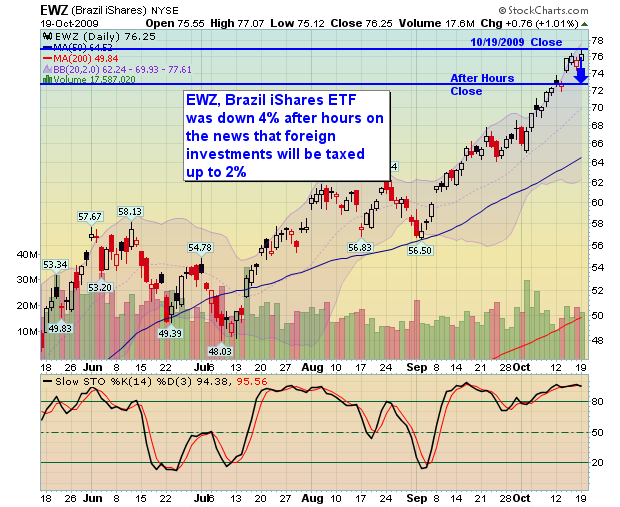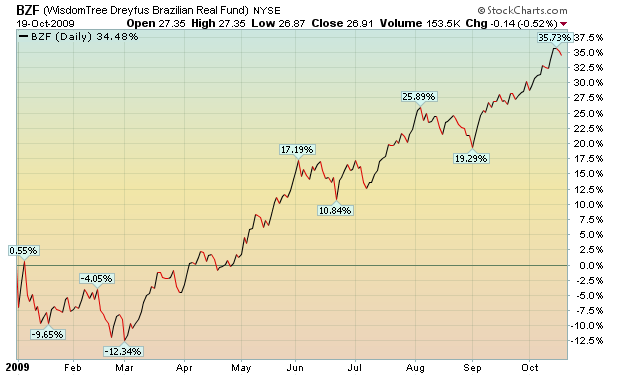After the close on Monday, there was a shock to the Brazilian markets as an announcement was made that Brazil will be slowing foreign investment into the country. In as effort to cool the hot currency and speculation within the stock markets, they are reinstating policy from a few years ago.
Brazil has been one of the countries that has been concerned about the U.S. dollar’s status as the world’s reserve currency. Obviously this is of importance as their country has both oil and commodities as a core export. With the U.S. dollar under fire (due to the systematic devaluation through debt monetization by the Fed) many countries are worried about a long, healthy and sustainable global recovery when relying on the U.S. dollar as the backbone currency.
On the news, Brazil’s equity markets and futures dropped sharply overnight. (EWZ)
Brazil is especially sensitive as the 35% appreciation of their currency in 2009 that threatens to stall exports. The announcement surprised investors as did the notification that the tax will begin on Tuesday. Therefore there is no time to transition. Beginning tomorrow the new taxation rules will begin. The hope is that this will calm the rise of the Real and stop excessive market speculation in both the currency and equity markets.
Brazilian Real ETF – Real vs. U.S dollar
From Bloomberg:
Oct. 19 (Bloomberg) — Brazil will impose taxes on purchases by foreign investors of real-denominated, fixed-income securities and on purchases of stocks, Finance Minister Guido Mantega said.
The measures are being taken “to avoid an excess speculation in the stock market and in capital markets,” Mantega told reporters in Sao Paulo.
The real has gained 35 percent since the beginning of the year, the best performer amid the 16 most traded currencies tracked by Bloomberg. The currency has gained 5.3 percent in the past month.
The central bank started purchasing dollars on May 8 in a bid to temper the real gains. The currency weakened 0.5 percent to 1.7177 per U.S. dollar at 4:28 p.m. New York time.
Earlier today, the Brazilian real was cut to “underweight” from “overweight” in RBC Capital Markets‘ model portfolio on concern the government would impose new taxes.
Today‘s announcement reverses last year‘s decision to end such taxes. In October 2008, President Luiz Inacio Lula da Silva eliminated a tax, known locally as IOF, of 1.5 percent on foreign investments in certain financial products and of 0.38 percent on foreign-currency loans.
“Excess global liquidity could lead to an over-appreciation of the real,” Mantega said. That would threaten to hurt the country‘s exporters and further fuel demand for imports.
Foreign investor will pay a 2 percent tax when they enter the country to buy stocks or fixed-income securities.
In the short term, the measure may help keep the real above 1.7 per U.S. dollar, said Antonio Madeira, chief economist at MCM Consultores Associados Ltd. As the market creates new investment strategies to bypass the tax, the impact in the currency market will be lost, he said.
Mantega said the measures may not lead the real to weaken, but are designed to slow its appreciation and prevent the creation of bubbles in Brazilian markets. “These are to prevent excesses,” he said.
Latin America‘s biggest economy has rebounded from its first recession since 2003, powered by local demand. Industrial production expanded in the past eight months, companies resumed hiring and retail sales have returned to pre-crisis levels.
Gross domestic product, after contracting in the last quarter of 2008 and first quarter this year, expanded 1.9 percent in the April-June period from the previous quarter, beating analyst expectations for a 1.7 percent rise. Mantega has said the economy can grow 5 percent next year.
Brazilian central bank President Henrique Meirelles said in an interview last week that emerging-market currencies that have been appreciating as economies recover from a global recession may become volatile as markets overprice assets.
`Unnecessary Volatility‘
Central banks need to “alert investors and markets of the risks of exaggeration in the formation of prices, which can lead to future corrections and create unnecessary volatility,” Meirelles said in the interview in New York.
The real‘s gain this year is the largest among the world‘s 16 most-traded currencies. The Bovespa stock index rose 1.9 percent today and is up 80 percent this year.
The currency is gaining even as the central bank buys dollars daily in a bid to stem the advance.
Brazil‘s international reserves have risen by $26.1 billion this year to $232.2 billion on Oct. 16, according to data compiled by the central bank.
Analysts estimate the real will end the year at 1.75, according to the median of 20 forecasts compiled by Bloomberg.
Brazilian economists raised their year-end forecast for the real to 1.7 from 1.76, according to a weekly central bank survey of about 100 analysts published today.
“We don‘t want short-term speculation, we don‘t want exaggerations,” Mantega said.
Disclosure: Horowitz & Company clients may hold positions of securities mentioned as of the date published.


















